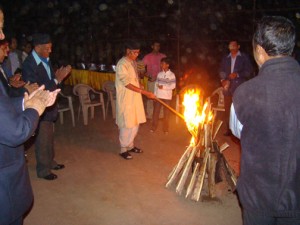 After bidding goodbye to the previous year on 31st December, people waited with warm hearts for the first festival of the year as the climate became colder. We, the Assamese, call it “the Bihu”; other Indians have different names to it but the cause of celebration is the same.
After bidding goodbye to the previous year on 31st December, people waited with warm hearts for the first festival of the year as the climate became colder. We, the Assamese, call it “the Bihu”; other Indians have different names to it but the cause of celebration is the same.
Celebrated in mid-January, the day of Magh Bihu, the traditional festival of Assam, is the time when winter goes towards the way of spring. It is also known as Bhogali Bihu; the word “bhog”, itself signifies eating and enjoyment. People make different food items like pitha (cake made of flour of rice), doi (curds), chira (dry rice), fish, meat, etc., as they prepare for the prayer to god. ‘Uruka’ is the day before the Magh Bihu. The night of ‘Uruka’ has great importance. The night before Bihu, people indulge in heavy feasting. Early next morning, mezee (thatched pavilions) are lighted, around which people pray and feast on pitha (made of sticky rice), narikol (coconut) and til (sesame) laddus, sweet potatoes.
Magh Bihu is also a time to reinvigorate the feeling of belongingness in a land away from home. The Assamese community in Pune celebrated Bhogali Bihu to mark the end of the harvesting season and to welcome plenitude. On the cold evening of 17th January, some 200 people gathered at Parsi Gymkhana, Camp. The function was inaugurated by Brig. R.J. Sharma, President, Pune Cantonment Board, followed by lighting of the mezee “bonfire” by Dr Kaur, a veteran from Assam. The assembled people had a taste of narikolar (coconut) laddu around the bonfire.
A cultural function followed with beautiful Bihu dances and Assamese songs. One of the main attractions was tambola; almost everyone participated in it. At the end, there was a lavish “BHOJ” dinner with chagoli mangxho “mutton” and maash “fish” with various other delicacies.
The beautiful function was organized by H. N Bhuyan, Utpal Sarma, Pulak Borthakur, Pranjal Saikia and Dhritiman Das with the people of Assamese community residing in Pune.
Pranjal Saikia, Pune
- Log in to post comments